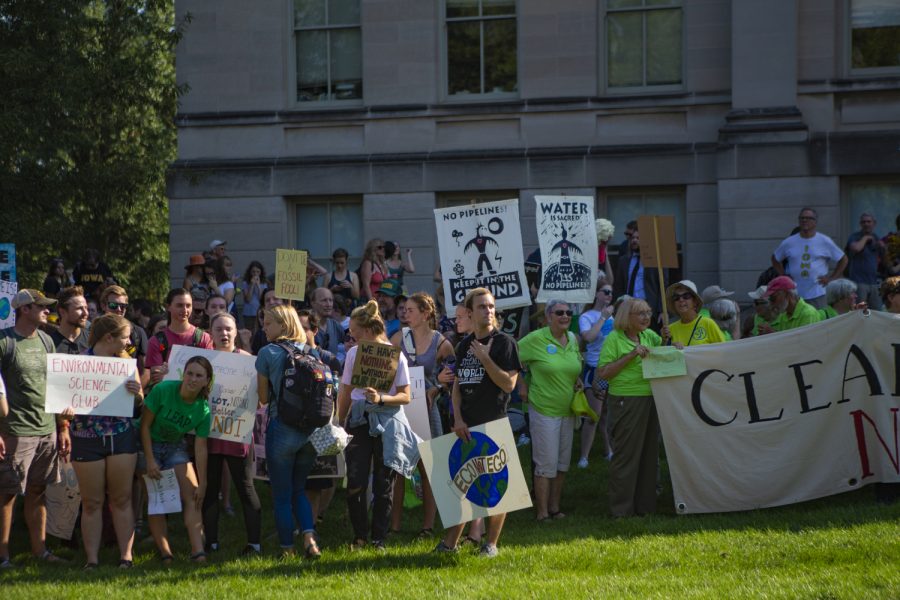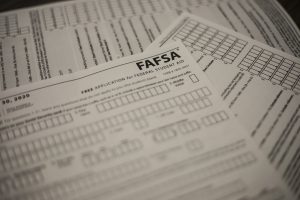Global Climate Strike continues in Iowa City with an open letter to the UI’s President Bruce Harreld
In an open letter to the UI’s Bruce Harreld, local participants in the Global Climate Strike call on the UI to respond proactively to climate change.
A crowd of hundreds gathers on the Pentacrest lawn to raise awareness about climate change. The Iowa City Climate Strike march was one of hundreds taking place around the world on Friday, Sept. 20.
September 29, 2019
Local climate activists on Sept. 27 in a letter to University of Iowa President Bruce Harreld demanding the university take resolute action against climate change.
The strikers, a group consisting of majority high-school and college students, joined the Global March Sept. 20 to walk from City Hall to the Pentacrest in demand of support against climate change following the passage of Iowa City’s Climate Resolution.
The resolution from Iowa City and the Iowa City School District school board pledged to gradually reduce greenhouse-gas emissions and eventually reach zero emissions by 2050.
RELATED: UI moves forward in exploring public-private partnership
The group again gathered Sept. 27 to call for UI action. Demands from strikers include that the UI follow suit, as well as permanently close the UI’s coal-fired power plant, which is a major point of contention between the advocacy group and the college.
Now, Iowa City Climate Strikers and 100 Grannies, the climate action organization, call on the UI to “make good” on promises it has made in the past to help climate action when it joined peer universities in the Big Ten conference to declare a climate emergency.
“That climate emergency has already reached the front doors of you and all of your students and all Iowans,” the letter read.
The strikers also criticized the UI coal-burning plant, taking issue with its contributions to carbon-dioxide emissions, which they say factor into heart, respiratory, and related diseases and deaths across the country.
RELATED: Iowa City Global Climate Strike march demands climate action
While the strikers acknowledge that the UI is in the process of pursuing biomass instead of coal for energy, the group stated that this decision has only caused a higher rate of natural gas use and increased “devastating” fracking across the state.
In addition, the letter addresses the UI’s exploration of a public/private partnership to use a private entity to operate and maintain its power plant with a fifty-year-lease, suggesting that administrators are acting without the consent of the community this decision affects.
The agreement has not been finalized yet. UI officials have held a number of public forums on both sides of campus to seek feedback on the possible partnership.
The UI plans to be coal-free by 2025, as previously reported by The Daily Iowan, and administrators have said they would hold the firm involved in the possible partnership accountable for upholding the UI’s commitment to sustainability if the agreement moves forward.
“The potential partners in this next round have illustrated a commitment to our employees, ensuring the UI is coal-free by 2025 and the additional responsibilities we outlined toward a sustainable future,” Harreld said in a July statement.
RELATED: City Council declares a state of climate crisis
As for the UI’s plans to aim for 40 percent renewable energy, the strikers argue this number is not high enough when various schools across the country are committing to a 100 percent goal.
Finally, the group references previous UI expenditures, stating that if the university can ask the state for $88 million to renovate the Pentacrest and around $90 million to renovate Kinnick Stadium seats, it can do more to combat climate change.
The Kinnick North End Zone project — which added seating options, restrooms, and a video board, among other features — was funded through private gifts and revenue from the Athletics Department, which is self-sustaining and does not benefit from state or taxpayer support.
The group hearkened back to a quote from past UI President Thomas Macbride, who said, “The people would act today if the situation were clearly understood. The question is whether we do the right thing now or wait until the expense shall have increased a hundredfold.”
“It is time for you and the University of Iowa to do the right thing now,” the letter to Harreld finished.






